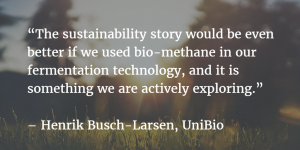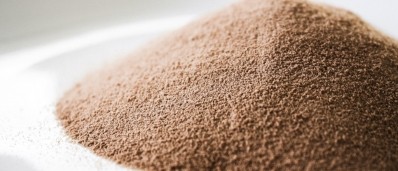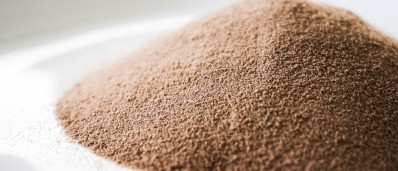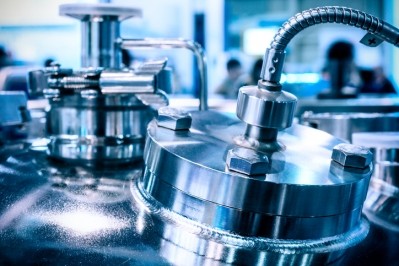UniBio secures Danish feed manufacturer buyer for methane gas to protein output

The biotech firm only announced this week it is to start construction on a commercial scale production facility, in Kalundborg in Denmark, which is scheduled to be on stream by the end of 2016.
“We have been working with Vestjyllands Andelfor a number of years now. They know the product. It is a great deal for us and we secured a very attractive price,” CEO Henrik Busch-Larsen, told us.
Torben Jensen, responsible for pig production at that Danish feed producer, said: “We believe in the additive, it is a credible new protein source, and one we intend to use in piglet feed.”
The facility at Kalundborg, when up and running, will be the first step in a planned global roll out of the technology.
UniBio is also planning to manage that roll-out from its headquarters to London, and, by doing so, raise its profile.
“Our objective is to build an international business. We are talking to international investors, and we are still aiming to attract capital by floating the company,” said the CEO.
Technology
Its U-Loop technology enables natural gas to be converted into a single cell protein – UniProtein - for use in feed, with the company’s primary focus being pig diets for now.
It does this via a process in which bacteria ‘eat’ the C1 connections in the methane gas, thereby grow and are converted into protein granules through a traditional downstream process.
It is similar technology to that used by another gas to feed protein biotech, US based Calysta.
“We have been refining the technology since 2001, and have optimized it so, by today, the process is showing critically high mass transfer from gas to liquid,” said Busch-Larsen.
Last year saw UniBio awarded a USD$2.2m grant from Innovation Fund Denmark for continued research, part of which supported the establishment of a U-loop pilot plant at research partner, Denmark Technical University (DTU).
UniBio is working in collaboration with DTU and Aarhus University to create a specific form of UniProtein in which the amino acid profile is tailored to pig feed.
Life cycle assessment
The Southern University of Denmark also carried out a life cycle assessment of the single cell protein on behalf of the company. “Full project data will be forthcoming but preliminary findings show that replacing 6.5% of soy in 20 to 30kg pigs with UniProtein would provide C02 savings the equivalent of driving a car from Southern Denmark to Northern Italy,” said Busch-Larsen.
He said the UniBio model is a sustainable method of feed production: “UniProtein will be adding to the protein supply but not creating additional stress on agricultural land or fisheries.”
The company is also looking to set up in countries with access to low cost sources of methane as it scales up internationally. In the US, such a source has come about through the rapid development of the fracking industry. “That is the least attractive model, seen from an environmental point of view,” said Busch-Larsen.
Biogas based production
UniBio, he continued, is also investigating the long term potential of using biomass derived biogas as a source for the methane gas.
“The [sustainability] story would be even better if we used bio-methane in our fermentation technology, and it is something we are actively exploring, there are several bio natural gas initiatives underway in Denmark currently, which we could leverage,” said the CEO.
He said the new production plant is strategically located near enzyme maker, Novozymes and insulin producer, Novo Nordisk’s facilities – both of which are in the pre-investigation phase of a project to create biogas from a production derived biomass by-product.
Those companies are looking to have a new plant approved by the relevant authorities. If the project is realized, partners, Bigadan and DONG Energy, will build and own the biogas plant, the plan being to build it close to Asnæs Power Station, just south of Kalundborg.
The idea is to transform biomass from Novozymes and Novo Nordisk into biogas at that site, which will then be upgraded to bio natural gas, said to be the most eco-friendly type of gas. The upgraded bio natural gas will then be fed into the natural gas network.
Feed tests
UniProtein was approved for animal nutrition in EU in July 1995 according to Commission Directive 95/33/EC.
The single cell protein has been the subject of feeding tests with calves, pigs, chickens, salmon and rainbow trout.
It achieved positive results in terms of acceptance and growth, plus increased resistance to disease was observed in some species.
In one study, published in the journal Meat Science, feeding pigs bacterial protein meal was found to improve the oxidative stability and sensory profile of the pork.
In another study, published in the Archives of Animal Nutrition, replacing soybean protein with bacterial protein meal at a level of 6% was found to increase feed conversion efficiency and amino acid digestibility in broiler chickens.
Sources:
“Bacterial protein meal produced on natural gas replacing soybean meal or fish meal in broiler chicken diets”
Archives of Animal Nutrition, 09/2007; 61(4):276-91. DOI: 10.1080/17450390701431953
Authors: HF Schoyen, B Svihus, T Storebakken, A Skrede
“Changes in fatty acid composition and improved sensory quality of backfat and meat of pigs fed bacterial protein meal”
Meat Science 71 (2005), 719–729
Authors: M Øverland, NP Kjos, E Olsen, A Skrede













